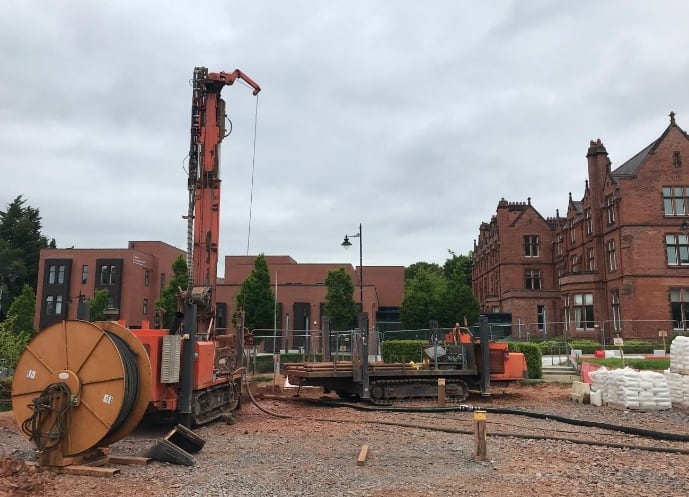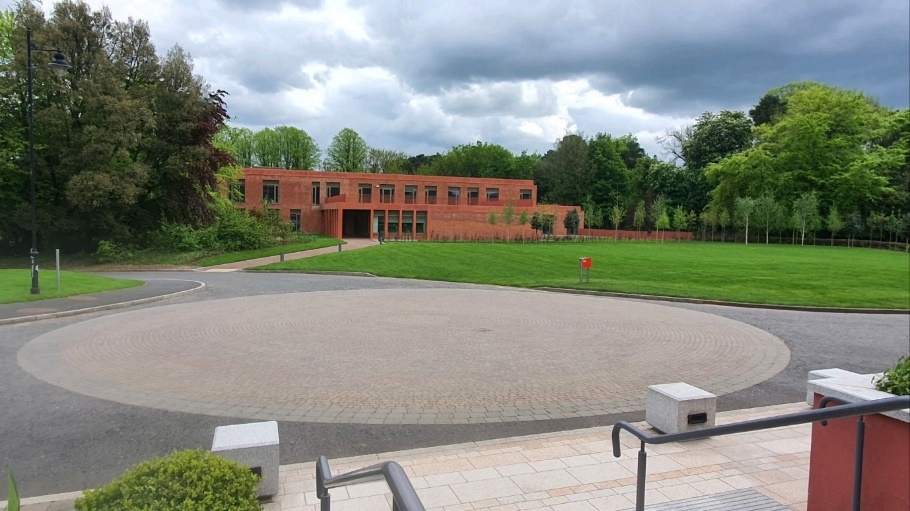As Queen’s University prepares to open its new geothermal-heated Business School building, Mark Palmer, Joseph Ireland (QUB) and Orla Hanna (DWF Law) consider if the opening of a geothermal-heated Business School marks a new chapter for sustainable energy in the North.
The leafy hillside and pristine gardens of Riddel Hall at Stranmillis in south Belfast reveal Queen’s University new Business School building. Nested within a crescent-shaped cluster of woodlands is the new red-bricked building which, at first glance, gives away little that this building could play an important role in our drive to make the country carbon-neutral. Nothing visible suggests a pioneering geothermal energy project looking at the front of the new building’s historical lawn and buxus hedges. Yet under the green lawns are 40 x 125 metre boreholes which are drilled into the Sherwood Sandstone formation with approximately 10km of collector pipework fitted that feeds the ground source heat pump system for the 6500 sq. metre building. The heat is harnessed from within the Sherwood Sandstone formation which runs under large parts of Belfast and elsewhere across the North.

Academic research and also geoscientific survey work by the Geological Survey of Northern Ireland (GSNI) shows that this Sherwood Sandstone formation is an important resource for harnessing and storing renewable heating and cooling. Perhaps what the opening of the new Business School shows is that repurposing and reworking this natural resource for heating (and cooling) networks can be a key piece of the puzzle of how to decarbonise our buildings. We know that in places such as Saclay, a suburb in southwest Paris, the next generation of geothermal district heating networks are being installed.
The geothermal-heated Business School offers many benefits. As Damien Toner, Director of Estates, Queen’s University Belfast noted, “Riddel Hall was a brownfield site used as a former running track and carparks. There was a real opportunity to maximise this new building opportunity from many perspectives – ecological, scale, quality and innovation. The Business School is one of the most successful schools in the university. All of these factors were critical in building the business case for investment at Riddel Hall.” A visit to the Business School helps to demystify the nature of geothermal energy. Upon entering the new building, you immediately feel a comfortable ambient temperature. Any niggling doubts dissolve away when the heat comforts you. The Business School can play an important role in bridging between basic geothermal knowledge and awareness on the one hand, and industrial application and domestic adoption in community heat networks on the other. Making the energy transition happen, according to Professor Mark Palmer, “Will require buildings to be a pivotal part of the environmental decarbonisation puzzle and we know from research that heat accounts for just over half of final energy consumption, with around a third on transport and power making up the total.”
For instilling that all-important confidence, the building serves as a ‘show me geothermal working’ for new build project developments and business model cases. As Professor Ravishankar, Dean and Head of Queen’s Management School noted, “Our new building serves as a national geothermal energy flagship, highlighting our pioneering approach to technology adoption and our commitment to environmental decarbonization. Importantly, it demonstrates these principles through tangible actions that resonate with our future business leaders, the students. Our building has no carbon emissions, as we have eliminated the use of fossil-fuel operating boilers.”
As new legislation is introduced by the UK government aimed at targeting so-called ‘greenwashing’ by companies and individuals under the Digital Markets, Competition and Consumer Bill, evidencing the net zero transition actions and backing-up claims made in Environment, Social and Governance (ESG) reporting and Climate Act compliance will become much more prominent and significant.
The opening of this building coincides with a workshop co-organised in partnership with Queen’s University and the Northern Ireland Housing Executive that invites over 70 organisations at the new Business School to hear practitioner-informed assessments of key developments on building heat networks and geothermal activity. The workshop takes place on Tuesday 4th July from 09:00am-12:30pm, with keynote speakers that include Dr Matt Trewhella, Chief Executive Officer, Kensa Group, which are the leading manufacturer of ground source heat pumps (GSHP) in the UK, and who will provide an update of their vision for street-by-street heat networks across the UK. We will also hear about recent milestone projects such as which upgraded energy to over 270 residences in Thurrock Borough Council in Essex, England.
Dr Matt Trewhella, Chief Executive Officer, Kensa Group commented, “This QUB-NIHE workshop is important to open conversations with the trade, public institutions, and communities considering using geothermal heating and cooling solutions. We are currently delivering networked geothermal projects across the UK mainland and there are opportunities to build heat networks in Northern Ireland, particularly given its favourable geology.” Kensa reports that replacing the night storage heaters with ground source heat pumps will reduce running costs by up to £500 per year, but also cut carbon emissions by 70%. This will save an estimated 7,080 tonnes of CO2 over the lifetime of the heat pumps – the equivalent of taking 1,540 cars off the road.
Andrew Frew at the Northern Ireland Housing Executive explained, “At our joint workshop we will hear how low-temperature heat of approximately 20-30°C can be pumped up and fed into a pipeline system that connects clusters of buildings, often referred to as heat networks or 5th generation district heating, each building or cluster with its own heat pump to upgrade the heat to the required temperatures. NIHE manage over 83,000 homes and over 30-high rise flats across Northern Ireland, and we are considering many solutions to ensure that the energy transition is a just one for all of society.”
Heat networks and geothermal require legislation and supporting policy, and so we will hear about the significant progress made under the 2022 Department for the Economy’s Energy Strategy Action Plan that committed to delivering geothermal demonstrator projects at Stormont and CAFRE. Richard Rodgers, Head of Energy, the Department for the Economy, will outline the importance of the need to move fast to be part of enabling supply chains and not waiting at the back of the queue. Following the keynote presentations, there will be three panel-led question-and-answer discussions from a range of practitioners, including geoscience project consultants, drilling firms, GSNI, NIHE, Belfast Health Trust, NI Water, local councils, District Heating, DWF Law, Alternative Heat, NI Community Energy, CeraPhi, Causeway Energy, Terra GeoServ Ltd, Tetra Tech, Action Renewables, the Utility Regulator and the Consumer Council. This is an opportunity to hear about and discuss geothermal and heat network projects.
Opportunity is where you find it, says an old proverb. You might ask where you can find and unlock natural resource opportunities? Well, there is an abundance of natural resources all around us, and harnessing those with technologies, business innovation, and communities can bring many benefits to our economy and society. Rural and urban communities can organise themselves collaboratively and rethink their energy demands, perhaps forming community heat networks. As the UK Climate Change Commission report recently noted, decarbonising the built environment in Northern Ireland ‘remains at an early stage’. However, taking steps towards any journey often begins with a single step. As we see from Wind and PV solar, this does not automatically mean an immediate transition or short-term savings, but long-term value creation and carbon reduction.
Amidst the present circumstances of climate change risks and threats, and the collective task of pursuing efforts to limit the temperature increase to 1.5⁰C above pre-industrial levels, there are opportunities to find, but also making opportunities. This seemingly simple statement and target is hard to comprehend and puzzling for even the most clued-up climate data scientists. For most, the question is how net zero questions relate to the implementation of Sectoral Plans and Local Area Energy Plans. There is opportunity-making potentiality for thermal energy storage, including pit or aquifer, developing heat networks with the necessary flexibility to integrate renewable and waste-heat sources. There are opportunity-making prospects when combining natural geothermal resources with digital solutions, predictive artificial intelligence in control systems, and matching heating and cooling production with demand, maximising efficiency. There are both opportunity-finding and opportunity-making ways to decarbonise the built environment.
Still, there remains much work to be done in building system readiness. Much to be done in building the confidence of stakeholders in managing change. The Queen’s Business School is an accumulation of a great deal of hard work by the University Estates team, and the contracted builders O’Hare & McGivern Limited and partners. It is a remarkable building with the combined synergistic qualities of the BREEAM building standards and complementary PV solar and Swift bird bricks added into the mix. The opening of the geothermal heated business school is only one single step. To build geothermal community projects and provide heat networks, the challenge may be bringing many steps into line such as geoscience data, drilling, mechanical, electrical, and plumbing operations, and ensuring that each part is marching in time and in the same direction. This is a challenging task, as it involves building capacity steps including finance, law, planning, community engagement and collaboration, geothermal and heat network legislation, regulation and consumer protection as well as data generation and the fusion of data to inform behaviours and to help shape incentives to switch from carbon fossil fuel intensive activities. The new chapter awaits; so, do market-making opportunities and opportunity-making steps.

QPol is the ‘front door’ for public policy engagement at Queen’s University Belfast, supporting academics and policymakers in sharing evidence-based research and ideas on the major social, cultural and economic challenges facing society regionally, nationally and beyond. Website: qpol.qub.ac.uk Email: [email protected]
Discover more from Slugger O'Toole
Subscribe to get the latest posts to your email.
